YALTAM
| YALTAM | |
|---|---|
| יחידה למשימות תת-מימיות | |
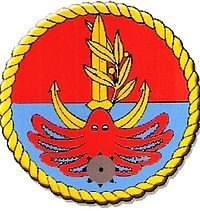 Unit logo | |
| Active | 1963 – present (modern form since 1981) |
| Country | |
| Branch | |
| Type | Special Purpose Unit |
| Role | Search & Rescue, Underwater detection, bomb disposal, sabotage, amphibious assaults, |
| Size | ~100[1] |
| Part of | |
| Garrison/HQ | Haifa naval base |
| Nickname(s) | Unit 707 |
| Commanders | |
| Notable commanders | See #Commanders |
| Insignia | |
| YILTAM "Octopus Wings" |  |
| Unit 707 "Octopus Wings" |  |
Yaltam (Hebrew: ילת"ם) is the Israeli Navy Underwater Missions Unit (Hebrew: יחידה למשימות תת-מימיות Yechida le'Mishimot Tat-Mayimiyot), specializing in diver operations. The unit was initially established as Unit 707 in 1963 but in its present form it was established in 1981. It is headquartered at the Haifa naval base
Bases
[edit]In 1965, the area that was formerly used by Torpedo Squadron in Haifa naval base was transferred to Unit 707. The unit's headquarters, the workshop, the dining hall and the living quarters were all situated there. Since the culvert there was suitable only for Shayetet 11 vessels, the unit's men themselves built a pier to launch their vessels.[citation needed]
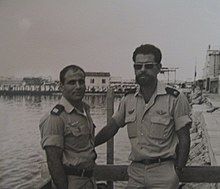
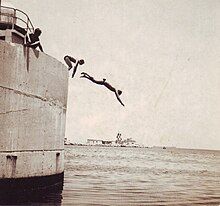
Two technicians who were also the vessel operators were given a designated area for maintenance, the commander of the unit appointed Major George Golani as chief of maintenance.[citation needed]
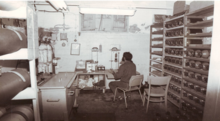
During the War of Attrition the unit's numbers grew and its squads were permanently deployed in other locations. The diver squad of the Eilat Naval Base had nine divers who also carried out inspections of civilian Oil tankers. A similar force was in the Sharm el-Sheikh. The unit's headquarters remained in the Haifa naval base. After the Yom Kippur War, a large part of the unit stayed at the naval base in Fanara, west of Bitter Lakes. A squad of about ten people was at the naval base in Sharm el-Sheikh until the evacuation of Sinai Peninsula as part of Egypt–Israel peace treaty.[2][3]
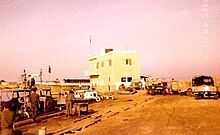
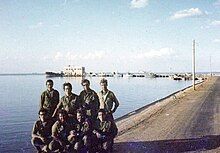
Selection & Training
[edit]The required medical profile for joining the unit is 72-97 and a special emphasis is put on ears and pressure comparison. Women are also recruited in this unit since 2004.[4]
The main method for joining the unit is through Shayetet 15 and then gradual progress. Before recruitment, psychotechnical tests and medical examinations are carried out and then they have to go on a voyage for two days on a Shayetet 15 vessel, it is not particularly physically difficult, but helps recruiters select the personnel according to their learning abilities, resilience and cooperation. Further training include a flooding room where personnel have to seal a room while it is being flooded, the vomiting boat with high physical stress being put on the body, drowning simulations and psychological challenges.[citation needed]
Then there is a day of medical testing at the Institute of Naval Medicine at the Haifa naval base. The qualifiers are then subjected to a two-day period including maritime training, a personal interview, a psychological and psychotechnical examination of the candidates, and more. Those who show outstanding performance join the unit while the rest join Shayetet 13 or the Snapir unit. These personnel will further have to train for a year.[citation needed]
The second way is outstanding performance in Shayetet 15 and a summon from the higher ups in the Israel Defense Forces. The training of such personnel lasts about 12 months in Bethlehem.[4]
The training course is divided into two parts, each of which lasts about six months. In the first part the personnel are trained in basic seamanship, counterterrorism, advanced diving, use of specialized tools, photography, navigation amongst other things. The maritime training is mostly carried out in mixed gender teams and includes trips, diving at different times of the day and night, swimming, underwater navigation training, prolonged diving amongst others.[citation needed]
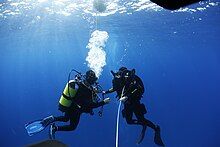
In the second part personnel learn professional diving, nitrox, activation of more complex measures under the surface of the water, rescue, detection and search, different command series, sabotage and bomb disposal.[citation needed]
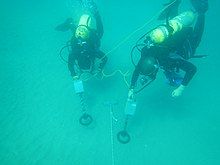
After this soldiers receive their formal combat pins.[citation needed]
Equipment
[edit]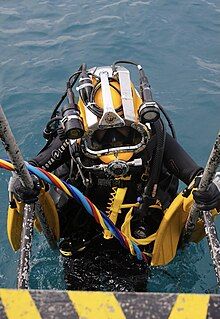
The unit's diving equipment includes various configurations for Surface-supplied diving and Nitrox-supplied diving. Moreover Unmanned underwater vehicles, SONAR, Minisubs and other equipment are also utilized by the unit.[citation needed]
History
[edit]Retrieval of a Gabriel missile
[edit]As as part of a presentation of fire to the Prime Minister of Israel, a Gabriel (missile) demonstration was carried out from a beach in southern Ashdod by launching it into the sea, but the missile couldn't be retrieved so the unit was dispatched to recover it. It was the first operational success of the unit.[5] Another missile was lost during a test near Palmachim, again the unit was dispatched and the parts of missile were located and retrieved.[6] The unit was also dispatched for the retrieval of an SS-11 anti-tank missile that fell into the ponds of Kibbutz Ha'on.
Retrieval of a Shayetet 13 vessel engine
[edit]An engine fell from a boat of Shayetet 13 in Haifa as it wasn't properly attached. The task of its retrieval was assigned to the unit. It was another successful mission for the unit.[citation needed]
Construction of Ashdod port
[edit]During the construction of the Port of Ashdod, the unit personnel carried out blasting at the bottom of the harbor to remove rocks that were interfering with the construction.[citation needed]
National Water Carrier of Israel
[edit]When the National Water Carrier of Israel was established, the unit received a mission to locate salt water channels under the water surface . Moreover, the unit was called to establish a protection system for Degania Dam at the Sea of Galilee to protect it against any possible Jordanian assault.[7]
Tiran mine search
[edit]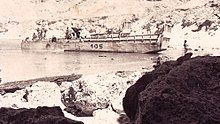
After the Six Day War, during the Israeli occupation of Sinai, a mine searching team of twelve personnel along with a journalist were dispatched to the Straits of Tiran on June 10, 1967, in two vessels but due to high currents the mission wasn't carried out when water calmed down the search began but no mines were found.[8]
Oil well inspections
[edit]On July 13, 1967, a squad of four unit personnel were dispatched to inspect oil production facilities in the Gulf of Suez and found them unharmed. Oil production was resumed and some personnel were stationed to monitor the oil wells.[citation needed]
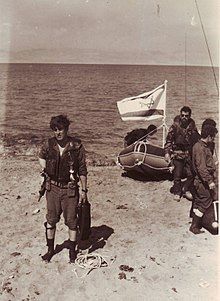
Anti Hijacking operations
[edit]On July 16, 1967, an Egyptian ferry which was hijacked sailed towards Israel and seemed hostile. The unit along with Shayetet 13 raided the ferry at night and discovered it was operated via an underwater cable and was laden with 200 kg of explosives. The cable was disconnected and the explosives were removed. The vessel was then sailed to Israel.[9][10]
Recovery of bodies from INS Eilat
[edit]INS Eilat sunk on October 21, 1967, most survivors and bodies were recovered that day. Next day the unit personnel scanned the ship's corridors, finding more bodies and removed equipment pieces so as not to let them into Egyptian hands. The trapped bodies were freed by explosion, two bodies and many body parts were then retrieved.[11]
Jordan valley conflict
[edit]On 1 January 1968 Israeli and Jordanian forces also exchanged fire without known casualties.[12] In March 1968, during the Battle of Karameh, Israelis attacked the town of Karameh, Jordan, the site of a major PLO camp. The goal of the invasion was to destroy Karameh camp and capture Yasser Arafat in reprisal for the attacks by the PLO against Israeli civilians, which culminated in an Israeli school bus hitting a mine in the Negev.[13] However, plans for the two operations were prepared in 1967, one year before the bus incident.[14] When Jordan saw the size of the raiding forces entering the battle it was led to the assumption that Israel had another goal of capturing Balqa Governorate to create a situation similar to the Golan Heights.[15][16] Israel assumed that the Jordanian Army would ignore the invasion, but the latter fought alongside the Palestinians and opened heavy fire that inflicted losses upon the Israeli forces.[17] The Israelis were repelled at the end of a day's battle, having destroyed most of the Karameh camp and taken around 141 PLO prisoners.[18] Both sides declared victory. On a tactical level, the battle went in Israel's favor,[19] and the destruction of the Karameh camp was achieved.[20] However, the relatively high casualties were a considerable surprise for the IDF and was stunning to the Israelis.[21] Although the Palestinians were not victorious on their own, King Hussein let the Palestinians take credit.[21][22][23] In August, 1968 Israeli and Jordanian forces engaged in a battle along the Sea of Galilee involving artillery, mortars, and machine guns.[24] For all these operations, the Unit 707 passed a cable between the banks of the Jordan river for the safe transport of Golani Brigade personnel across the river. The unit also retrieved dead bodies of Israeli soldiers as well as those of militants.[25] On June 22, 1969, an operation was carried out by the Golani Brigade to disrupt the flow of water from Yarmouk. It was decided to blow up two water conveyors and water passages. Seven soldiers of Unit 707 under the command of Nadav Sela participated in the operation along with multiple squads of Golani Brigade performing security, reinforcement, barricading and other duties. The main task of planting the explosives was carried out by the unit and the canal system was successfully destroyed and wasn't repaired till the end of the War of Attrition.[26]
Operation Raviv
[edit]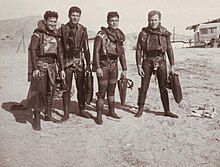
Before the start of Operation Raviv Unit 707 in rubber boats carried out reconnaissance missions along the Egyptian coast from the Ras Soder base and gained vital Intel for the operation.[27][28] The operation went smoothly around 100-200 Egyptians were killed for only three Israeli casualties and after the end of the operation, the unit also played an important role in the evacuation of the force via Shayetet 11 vessels, one of these was stuck so unit 707 personnel moved it back into water by pushing it with an Armoured Personnel Carrier.[29]
Egyptian Raids on Eilat
[edit]During an Egyptian raid on Eilat on November 15, 1969, a civilian ship "High South" was damaged and was put close to shore to prevent its sinking. Unit 707 repaired it and it was back into service.[30] Another civilian ship "Dahlia" was damaged having three holes blown into it but they were in isolated compartments so the ship did not sink.[31] On the night of February 5–6, 1970, the Egyptian naval commando attacked Eilat again sinking INS Bat Galim of Shayetet 11[32] and damaging INS Bat Sheva,[33] the Unit 707 was engaged in the repair of INS Bat Sheva.

Operation Sargent
[edit]On March 13, 1970, 16 "Shaked" Battalion fighters of Golani Brigade, six 707 fighters and a squad from the Marine Engineering Battalion attacked Egyptian positions in retaliation for repeated Egyptian Raids, the force landed across the Suez canal inflicting heavy casualties of around 30-40 Egyptians killed while suffering only nine wounded in an operation that lasted for around an hour.[34]
Sinking of Ovra
[edit]After the sinking of an Israeli civilian vessel on 13 May 1970, the unit and Shayetet 13 carried out an operation to retrieve the dead bodies, a body was found in the vessel and second washed ashore, the second task to locate the remains of Egyptian Styx missile wasn't accomplished.[35]
Operation Victoria
[edit]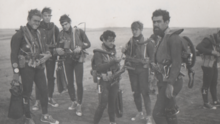
On June 11, 1970, the unit along with Shayetet 13 and Golani Brigade attacked Egyptian positions by crossing the Suez canal. They were supported by artillery fire from an Armoured Brigade and airstrikes carried out by the Israeli Air Force. The operation was immensely successful and stopped any further raids from Egypt. At the end of the operation, the unit also evacuated the casualties.[36]
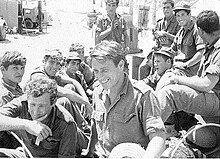
Operation Hood 20
[edit]On January 14, 1971, a raid was carried out on militant bases in the town of Serfand, south of Sidon. The naval force consisted of six Shayetet 3 vessels. Firstly a paratrooper force landed and fire was opened on it. The force achieved its objectives while fighting and suffered five wounded. A secondary force composed of Shayetet 13 and Unit 707 personnel raided militant positions a kilometer further north.[37]
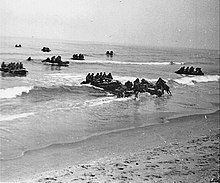
Operations Abroad
[edit]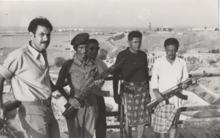
In June 1971, militants attacked an Israeli ship "Coral C" so unit 707 personnel were sent in tankers on their way to the Kharg fuel terminal in Iran. In the Bab al Mandab, the unit secured the vessels with machine guns and RPGs.[38] Also, in order to prevent any attacks by Egyptians, the unit personnel maintained a system of bottom checks to prevent sabotage at foreign ports.[39]
Operation Spring of Youth
[edit]In the Operation Spring of Youth four militant targets were simultaneously attacked in Lebanon. On April 9, 1973, the raiders were led in front of Beirut by Shayetet 3. The Unit 707 personnel were involved in the attacks and then also in the evacuation of the strike force.[40]
Operation Mosquito
[edit]On the night of October 9, 1973, a raid was conducted on the Egyptian coast in the Gulf of Suez. The ambush was carried out by a force from Unit 707 under the command of Lt. Col. Dov Bar and a second force from the Shayetet 13 under the command of Major Gadi They attacked vehicles and severed electricity lines.[citation needed]
Crossing the Suez
[edit]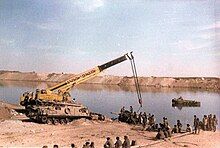
During the crossing of Suez Canal during the Yom Kippur War a force from Unit 707 assisted the Engineering Corps. They evacuated bodies of Egyptian soldiers stuck on bridges and assisted in rescuing tanks that had sunk into the water.[41]
Operation Heavy
[edit]On October 17, 1973, divers from Unit 707 set sail in Shayetet 15 vessels. They located two communication facilities in the sea off Beirut and damaged them. The communication between Egypt and Syria was cut off.[42]
Suez Bridge takeover
[edit]On October 23, 1973, a force of 10 Unit 707 personnel along with air support from Israeli Air Force carried out an operation in Suez, with the aim of taking control of a bridge that allowed the transfer of troops to the Third Egyptian Army.[43]
Merger with Shayetet 13
[edit]After the Yom Kippur War, the commander of the Navy, General Binyamin Talem, decided to merge Unit 707 with the 13th Fleet . The combination is done in two steps. At the beginning of 1974, a "small naval warfare unit" was established under the command of Col. Zvi Givati. In 1976, it was abolished and completely integrated.[44]
Re-establishment
[edit]In 1981, the unit now named as YALTAM was again established but as a much more advanced unit .[45]
Anti militant operations
[edit]In the 1980s, the unit personnel thwarted an attempted militant attack on Nitzanim Beach by two militants, capturing a huge cache of weaponry and ammunition.[1] Similarly in the late 1980s, a militant attempted to infiltrate Rosh HaNkira, but was thwarted by a combined force of YALTAM and Shayetet 15.[1] It also carried out a raid in Lebanon destroying motorcycles of militants.[1]
Retrieval of Arrow Missile
[edit]YALTAM was also tasked with operational testing of Arrow missiles and on many occasions was also deployed to retrieve the fired missiles.[1]
Search and Rescue Operations
[edit]Over the years, the unit personnel have participated in a large number of search and rescue operations including various operations in search of the missing IDF personnel in the Sea of Galilee and the search operations for the Dakar submarine.[46] It was also a part of the task force to rescue a Shayetet 3 vessel off the coast of Saudi Arabia and the retrieval of a helicopter that had crashed 800m below sea level.[1] In 2022, an Israeli Air Force helicopter crashed into the sea, YALTAM along with other units took part in its rescue and retrieval operation.[47]
Israel Hamas war
[edit]During the Israel Hamas war, the YALTAM fighters are performing operations to locate underwater explosives and other such weaponry of Hamas and they've been shown to be highly successful in this regard.[48]
Cooperation with other units
[edit]The unit maintains close cooperation with various parties in the sea arm, such as the Shayetet 3, Shayetet 13, and Shayetet 11 as well as with other IDF and civilian units, such as the Home Front Command.[4]
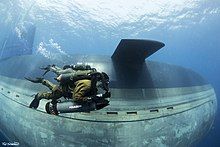

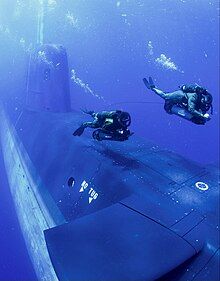
In addition, it is known to conduct joint operations and military exercises with foreign units including the French Navy and the American Navy.[49][50]
Commanders
[edit]| Name | Period of tenure |
|---|---|
| Giora Nadiv | January 1981 - January 1983 |
| Yossi Der | January 1983 - November 1987 |
| Ilan Dovdvan | November 1987 - May 1993 |
| Meir Man | May 1993 - November 1995 |
| Moti Kern | November 1995 - July 2001 |
| Mordi Alkovi | July 2001 - September 2008 |
| Oren Rabha | September 2008 - August 2014 |
| Ido Kaufman | August 2014 - September 2019 |
| Oron Inbar[51] | September 2019 - July 2024 |
| Matan Bar | September 2024 - |
References
[edit]- ^ a b c d e f "Yaltam: The leading IDF unit you've never heard of". Jerusalem Post. Retrieved 15 August 2024.
- ^ "Camp David Accords: Framework for the Conclusion of a Peace Treaty between Egypt and Israel". The Jimmy Carter Presidential Library and Museum. Archived from the original on 5 December 2018. Retrieved 2020-11-13.
- ^ "Israel returns Sinai to Egypt". UPI. Archived from the original on 26 April 2016. Retrieved 2020-11-13.
- ^ a b c "YALTAM (Navy forces)". Kasda (Israel).
- ^ "מציאת חלקי טילים". Maritime Heritage Conservancy (Israel) (in Hebrew).
- ^ Shlomo Levy, p. 207
- ^ Water Resources in Jordan, Munther J. Haddadin, Resources for the Future, 2006
- ^ Shaul Sela, page 47
- ^ Israel Roth. "פירוק מלכודת בתעלת סואץ". Maritime Heritage Conservancy (Israel).
- ^ Shlomo Levy, page 245
- ^ Shlomo Levy, pages 257-255
- ^ "Exchange of Fire on Suez Canal when Egyptians Attempt to Enter Northern Passage – Jewish Telegraphic Agency". January 31, 1968.
- ^ Cath Senker (2004). The Arab-Israeli Conflict. Black Rabbit Books. ISBN 9781583404416. Retrieved 25 October 2015.[permanent dead link]
- ^ "Debacle in the desert". Haaretz. 29 March 1968. Retrieved 13 May 2011.
- ^ Patrick Tyler (2012-09-18). Fortress Israel: The Inside Story of the Military Elite Who Run the Country—and Why They Can't Make Peace. Macmillan. ISBN 9781429944472. Retrieved 2015-10-25.
- ^ الذكرى الثالثة والأربعون لمعركة الكرامة الخالدة. Petra News Agency (in Arabic). Ammon News. 2011-03-20. Retrieved 2015-10-25.
- ^ "1968: Karameh and the Palestinian revolt". The Daily Telegraph. 2002-05-16. Retrieved 2008-09-03.
- ^ "GUERRILLAS BACK AT JORDAN CAMP; Attack by Israelis Failed to Destroy Base at Karameh or Wipe Out Commandos". The New York Times. 1968-03-28. Retrieved 2015-10-26.(subscription required)
- ^ Zeev Maoz, Defending the Holy Land, A Critical Analysis of Israel's Security and Foreign Policy, University of Michigan Press, 2006, pages 244–246
- ^ Herzog, The Arab-Israeli Wars page 205
- ^ a b Spencer C. Tucker, Priscilla Roberts (2005-05-12). Encyclopedia of the Arab-Israeli Conflict, The: A Political, Social, and Military History: A Political, Social, and Military History. ABC-CLIO. ISBN 9781851098422. Retrieved 2015-10-25.
- ^ Kathleen Sweet (2008-12-23). Aviation and Airport Security: Terrorism and Safety Concerns, Second Edition. CRC Press. ISBN 9781439894736. Retrieved 2015-10-27.
- ^ "The Israeli Assessment". Time. 1968-12-13. ISSN 0040-781X. Archived from the original on November 23, 2008. Retrieved 2008-09-03.(subscription required)
- ^ "Israelis, Jordanians Exchange Fire; Egyptian Migs Chased over Sinai Peninsula". August 20, 1968.
- ^ Shlomo Levy, pages 263-266
- ^ Maariv, 'In the days and night', June 27, 1969
- ^ "סירת ברטרם". Navy Association (Israel).
- ^ הטירן עשה את שלו! (PDF). Shiryon (in Hebrew) (8). Armor Society: 20–26. May 2000.
- ^ Mike Elder, Shayetet 11, Pages 55 – 57
- ^ Shlomo Levy, "The Octopus of the Navy" (English title) pp. 283-277
- ^ Rab Hovel Hillel Yarkoni, "75 שנות ספנות עברית בארץ ישראל", pages 201, 273
- ^ Eli Levy. "פיקוד על אח"י בת ים (ת-83)". Maritime Heritage Conservancy (Israel).
- ^ "הצלת אח"י בת שבע". Maritime Heritage Conservancy (Israel).
- ^ "מבצע "סרג'נט" - "שקד" פועלת מעבר לתעלה". Shaked Battalion.
- ^ "החיפושים אחר 4 חברי הצוות הנעדרים נמשכים, והחיפושים אחר הספינות הישראליות הנעדרות נמשכים". NLI. 15 May 1970.
- ^ Pearl Pinkel (22 October 2019). "הפיראטים של סיני".
- ^ General Chaim Nedel (2015). "'המעז מנצח'". Systems Publishing. pp. 202–213.
- ^ Mike Elder. צי 13. p. 456.
- ^ Nadav Sela. "אבטחת אוניות ישראליות באירופה". Maritime Heritage Conservancy (Israel).
- ^ Avshi Ben Yehuda. דוח הפעולה בספרו של שלמה לוי. pp. 299–302.
- ^ Mike Elder, שייטת 13, pages 500-499
- ^ Mike Elder. שייטת 11. p. 355.
- ^ Eliezer Cohen, Zvi Lavi, The Sky Is Not the Limit - The Story of the Israeli Air Force, p. 509, Sefrit Maariv, 1990
- ^ "גדי שפי, מפקד שייטת 13 לשעבר, נפטר בגיל 75". Maariv (in Hebrew).
- ^ Mike Elder (1993). "שייטת 13 - סיפורו של הקומנדו הימי". Maariv Library. pp. 555–557.
- ^ "Nobody left behind: continue to search for the missing pilot". Israel Foreign Affairs.
- ^ "2 IDF pilots die in helicopter crash". TV 7 (Israel).
- ^ "תיעוד מחשיפת לוחמי הילת"ם בקרקעית הים". Israel Defense Forces (in Hebrew).
- ^ "צפו: תרגיל "מלינדה נובלת" של היחידה למשימות תת-ימיות בשיתוף חיל הים האמריקאי והצרפתי". News 0404 (in Hebrew). July 27, 2017.
- ^ "לוחמי ילתם" בתרגיל בינלאומי עם הצי האמריקאי והצרפתי". Israel Defense Forces.
- ^ https://www.mako.co.il/pzm-soldiers/Article-f9ac3ab5b6f1d61027.htm
- Mike elder," שייטת 13 - סיפורו של הקומנדו הימי", Maariv publishing, 1995
- יחידת ילת"ם on Mako
- פז"מ on Mako
- יחידת ילת"ם on Yehida
- יחידה on Yehida
- Dawn Landau, הכי עמוק שאפשר, 'Between Waves' 167 April 1986 p. 5.
- Raanan Cherbinski, עבודות מסוכנות בשבילנו זה שטויות - סיפורי החברה מהילת"ם, 'Between Waves' 174 June 1988 p. 12.
- Father Obel, רכב תת-ימי לילת"ם, 'Between Waves' 182 January 1991 p. 48.
- Yuval Karni, המומחים למעמקים, "Bin Galim" celebratory jubilee issue October 1998, p. 53.
- Zuf ben Eliezer, עולם הדממה של הצוללים המקצועיים, "Between Waves" September 2013, p. 72.
- Brit Almog and Uri Keren, עשרת הנבחרים מילת"ם, "Between Waves", September 2015, p. 26.
- Or Heller, צבא המצולות, "Israel Defense", 10 October 2016
- Brit Almog, נועה קרן החבלנית הראשונה בצה"ל, "Between Waves", October 2016, p. 82.
- Dan Arkin, אנשי המצולות, "Israel Defense", April 15, 2020
- Kobi wrot, "'יחידת החבלה הימית מימי המלחמה'", "Between the Waves" in the Navy Soldiers' Bulletin, December 1973, p. 6-7.
- Zvi Aloush, "שומרי הראש של הספינות"., June 8, 1977.
- Mike Elder, צי 13 - סיפורו של הקומנדו הימי. Maariv Library, Tel Aviv, 1993.
- Mike Elder, שייטת 11 - קרב צבא ההצלה. Hed Artzi Sefrit Ma'ariv, 1996.
- Mike Elder, יחידה 707, חוד החנית, שעשה הכל, יכול הכל, ונעלמה - למה?, 2014, (not yet published).
- George Golani, "'ספר חיים'", pp. 43–49, Yad Sara Publishing, 2016.
- Shaul Sela, 'יחידה 707 - טיוטה לכתיבת היסטוריה, Museum of Enlistment and the Navy, 1972.
- "'צוללת הגנתית'", Naval Systems, Booklet 95, September 1969.
- "צוללנים בנמלי ישראל - פרסום ראשון", August 13, 1968.
- Kobi - Reported by Bin Galim, סיפורי יחידת החבלה הימית מימי המלחמה, Bin Galim, December 1973, pages 6–7
- Eli Shaf, "'הצוללים המתינו למוקשים - בדיקות תת-מימיות'", Marine Systems, booklet 85, pp. 47–48.
- Zvi Shanar, "רב סרן ג'ורג' גולני - מפלצת מתחת למים", March 1965.
- George Parkash, האמודאים מתחת למים, "Naval Systems" 37–38, The Decade File for the Navy, July 1958, p. 96.
- Aria Dublin, טקס הענקת אות צוללן הגנתי, "Marine Systems" 94, June 1969. p. 44
- Eli Landau, הפשיטה מעבר לתעלה, 'Marine Systems' 99-100 September 1970, p. 26.
- יחידת החבלה הימית, 'Between Waves' special issue 25 for the Navy June 13, 1973, p. 9.
- Kobi wrot, יחידת החבלה הימית בימי המלחמה, between waves", December 1973, pp. 6–7.
- Abraham Butzer, Shaul Sela and Nadav Sela, על יחידה 707 ומפקדה Letters to the 707 fighters, October 15, 2011, on the website of the Naval Heritage Conservancy.
- Dev Bar, הניסיון לחילוץ אנשי מוצב המזח On the website of the Maritime Heritage Conservancy, 2016.
- Nadav Sela, אבטחת הספנות בצפון אירופה on the Maritime Heritage Conservancy website December 1, 2016.
- Danny Avinon, מעבר מיחידה 707 לילת"ם on the website of the Maritime Heritage Preservation.
- Nadav Sela, היסטוריה של יחידה 707, 2018.
- Nadav Sela, צלילה בואדי לאיתור מחבל. במרדפי הבקעה 1968, on the maritime heritage website, 2023.
